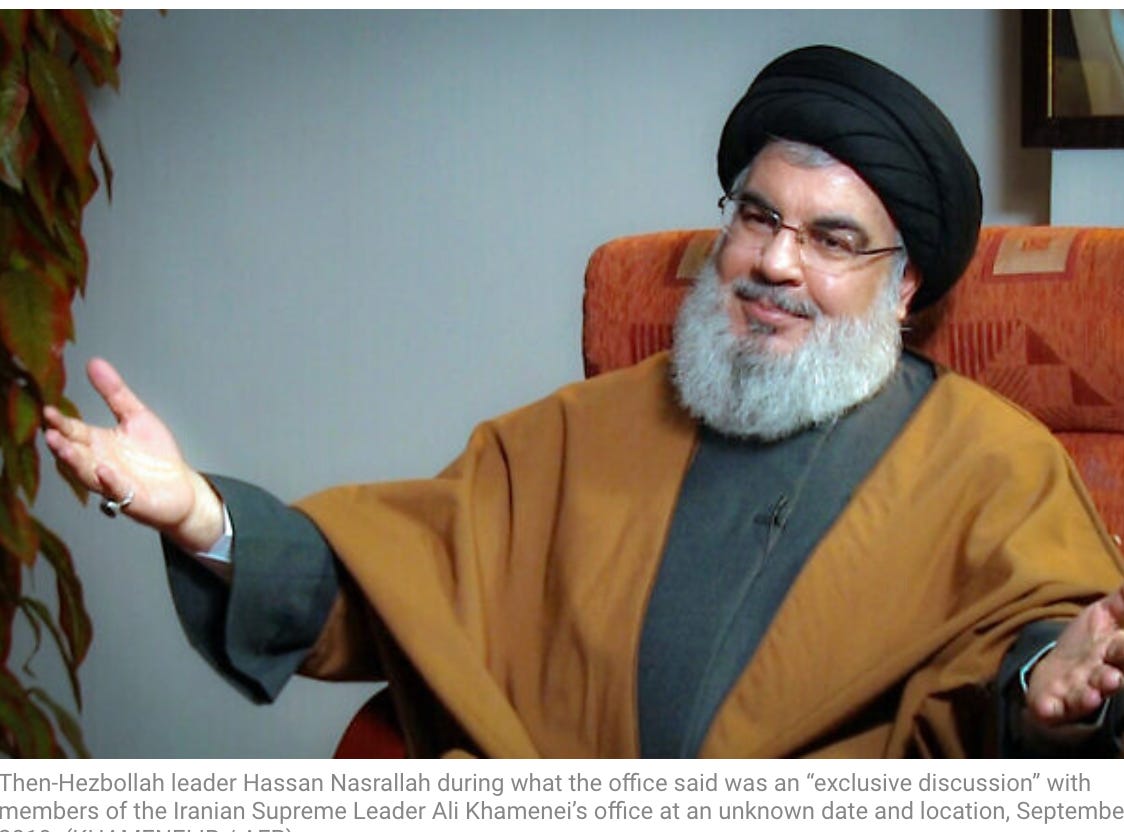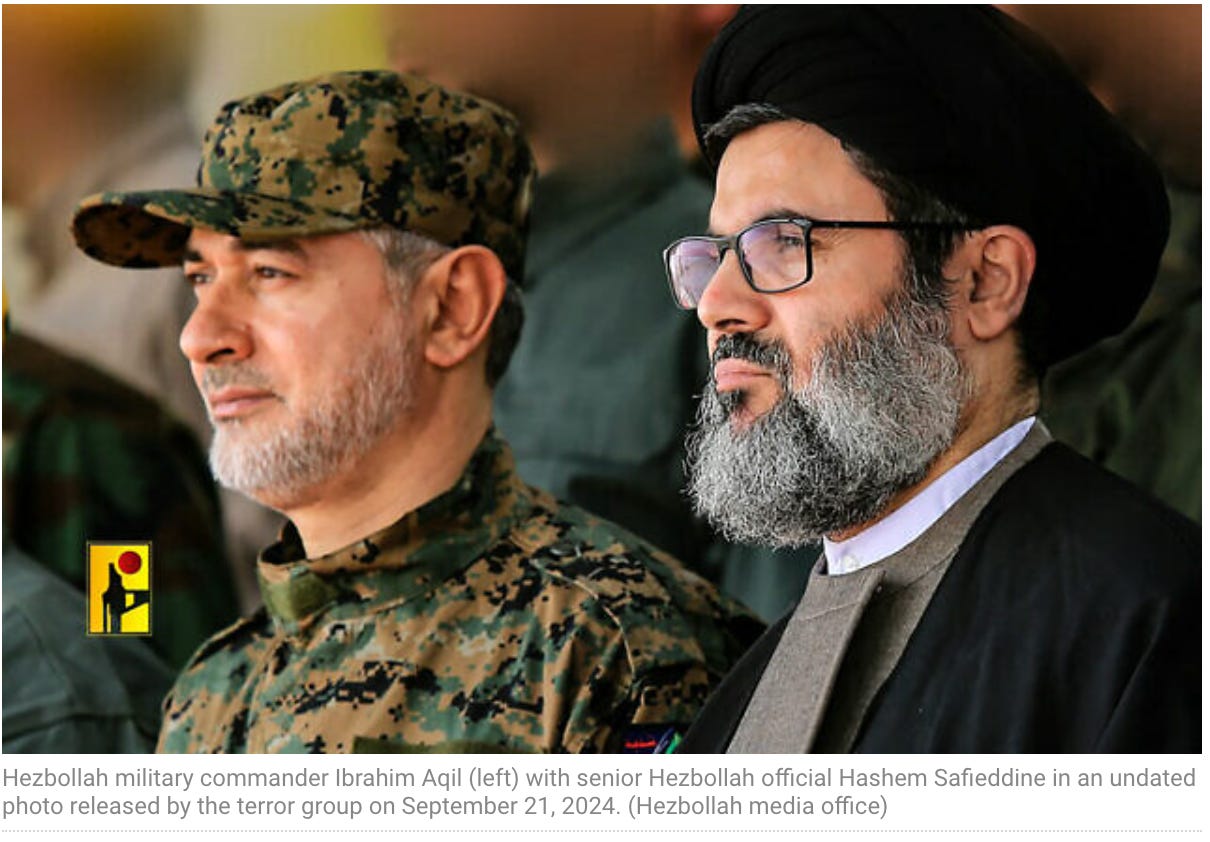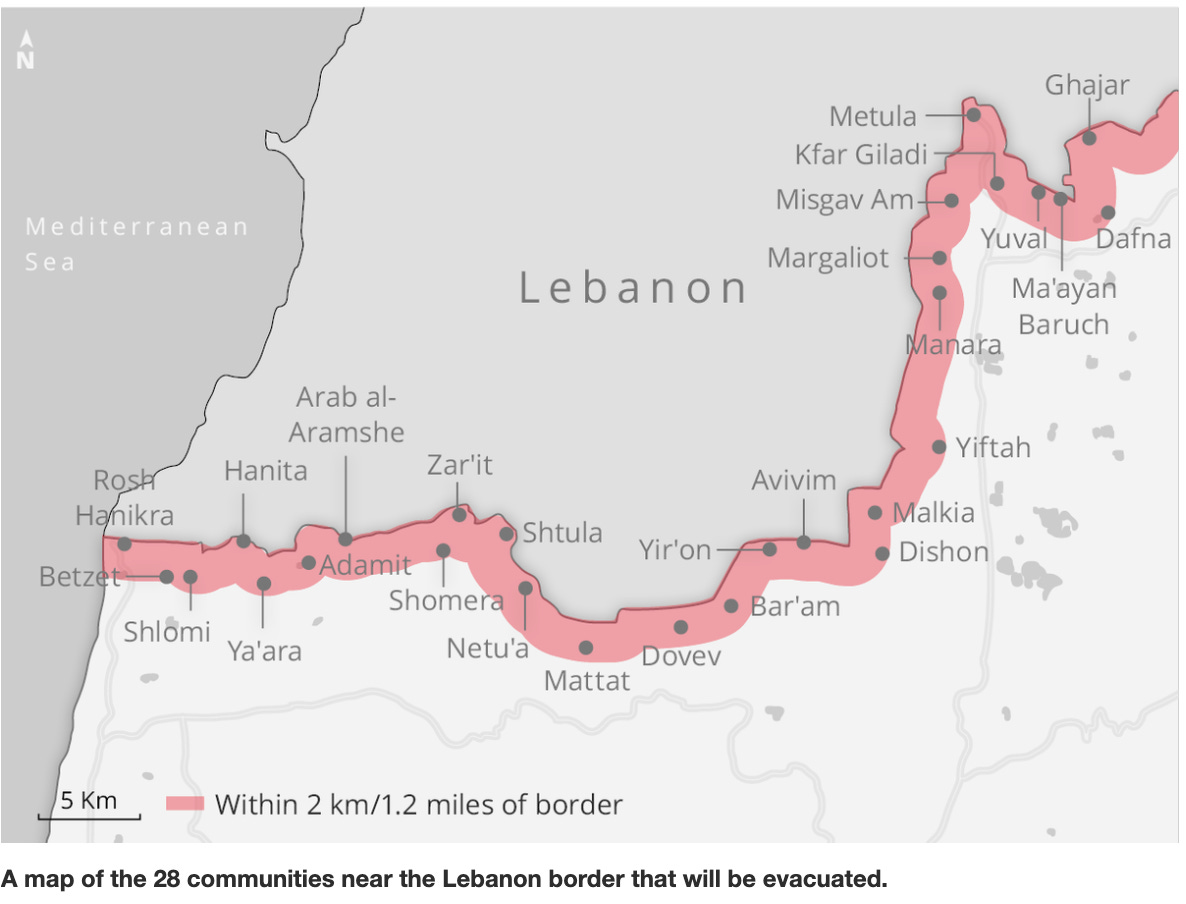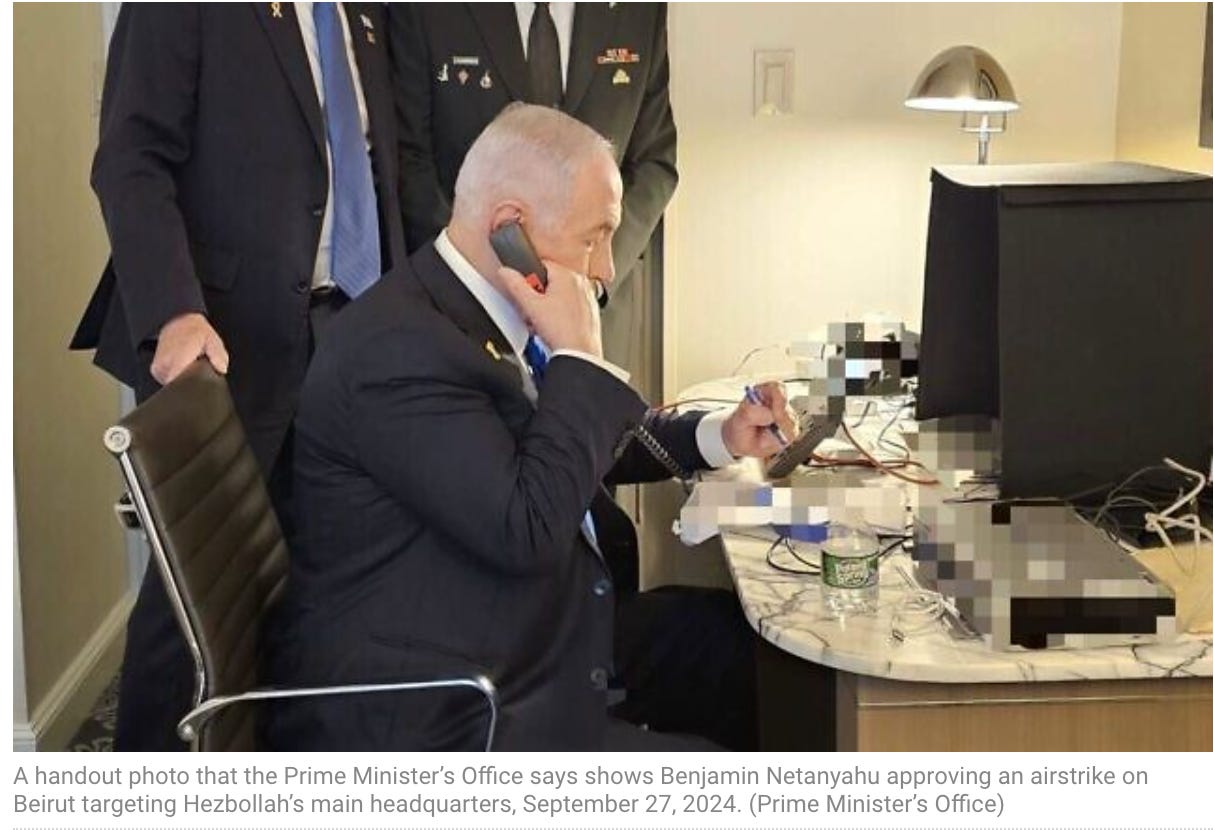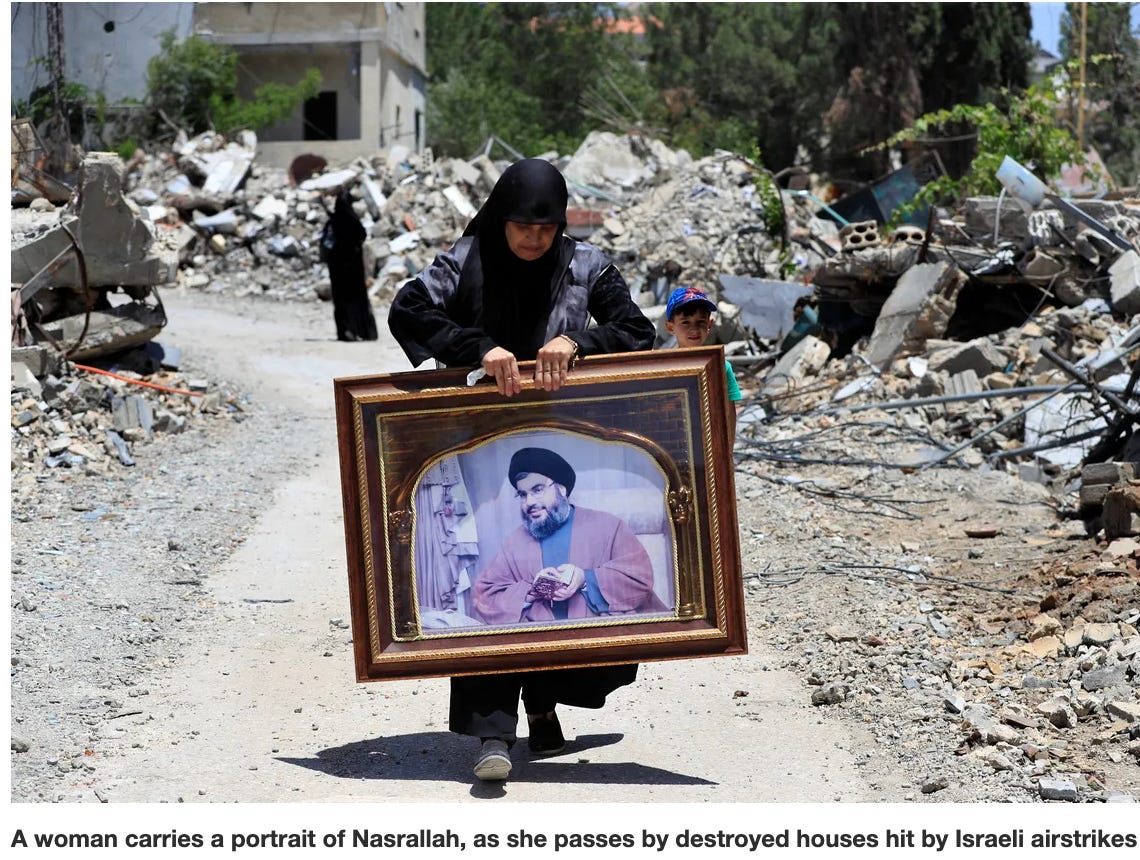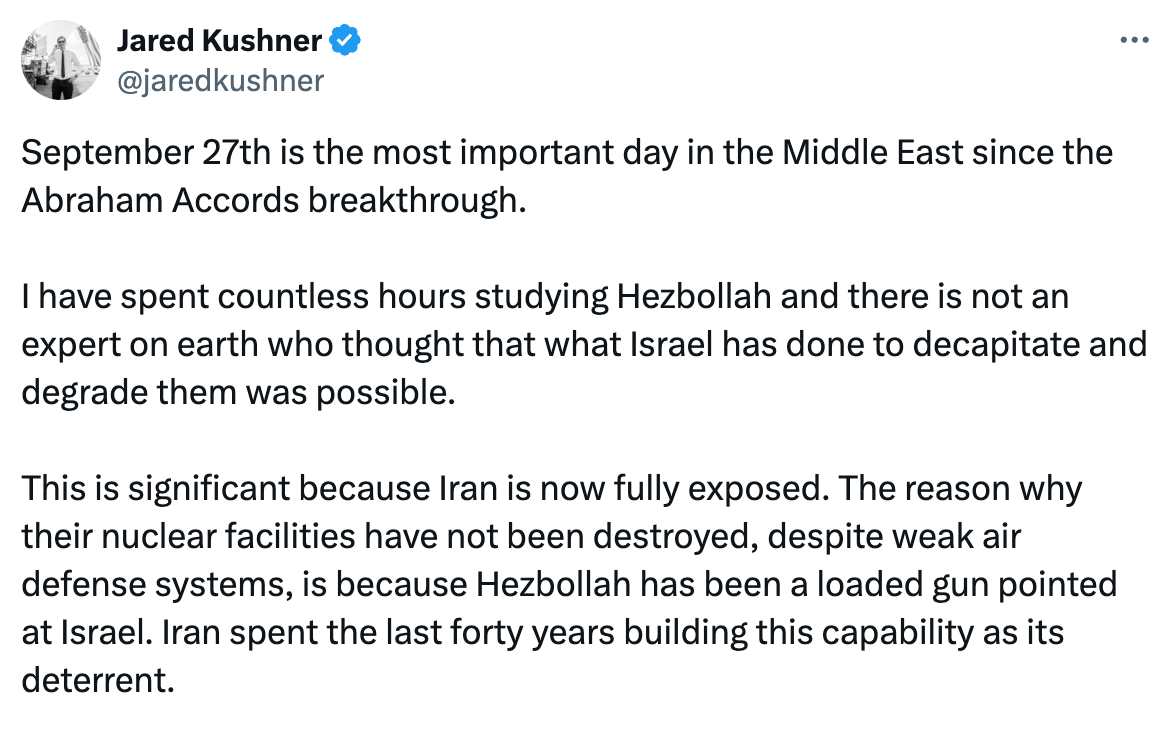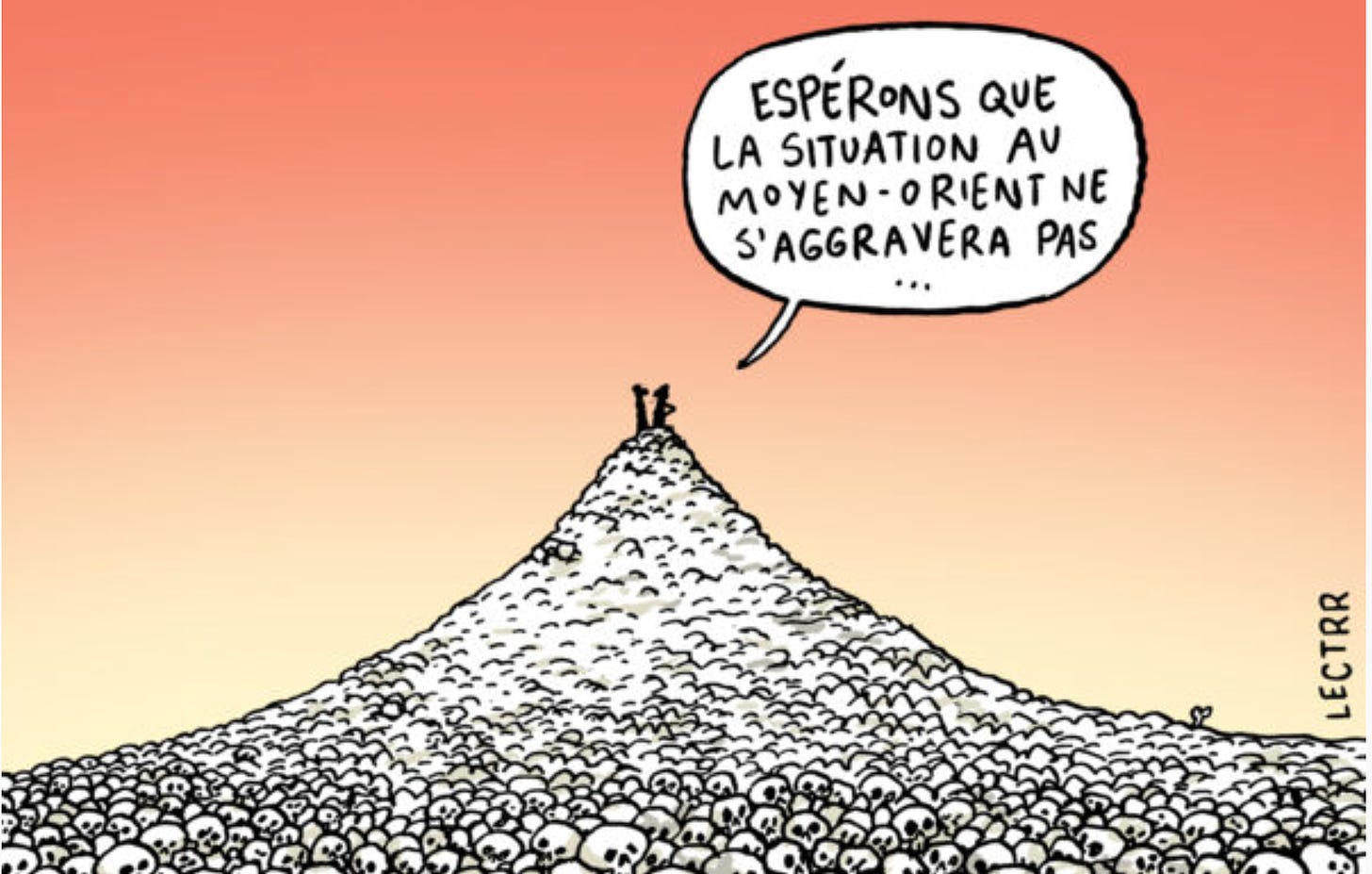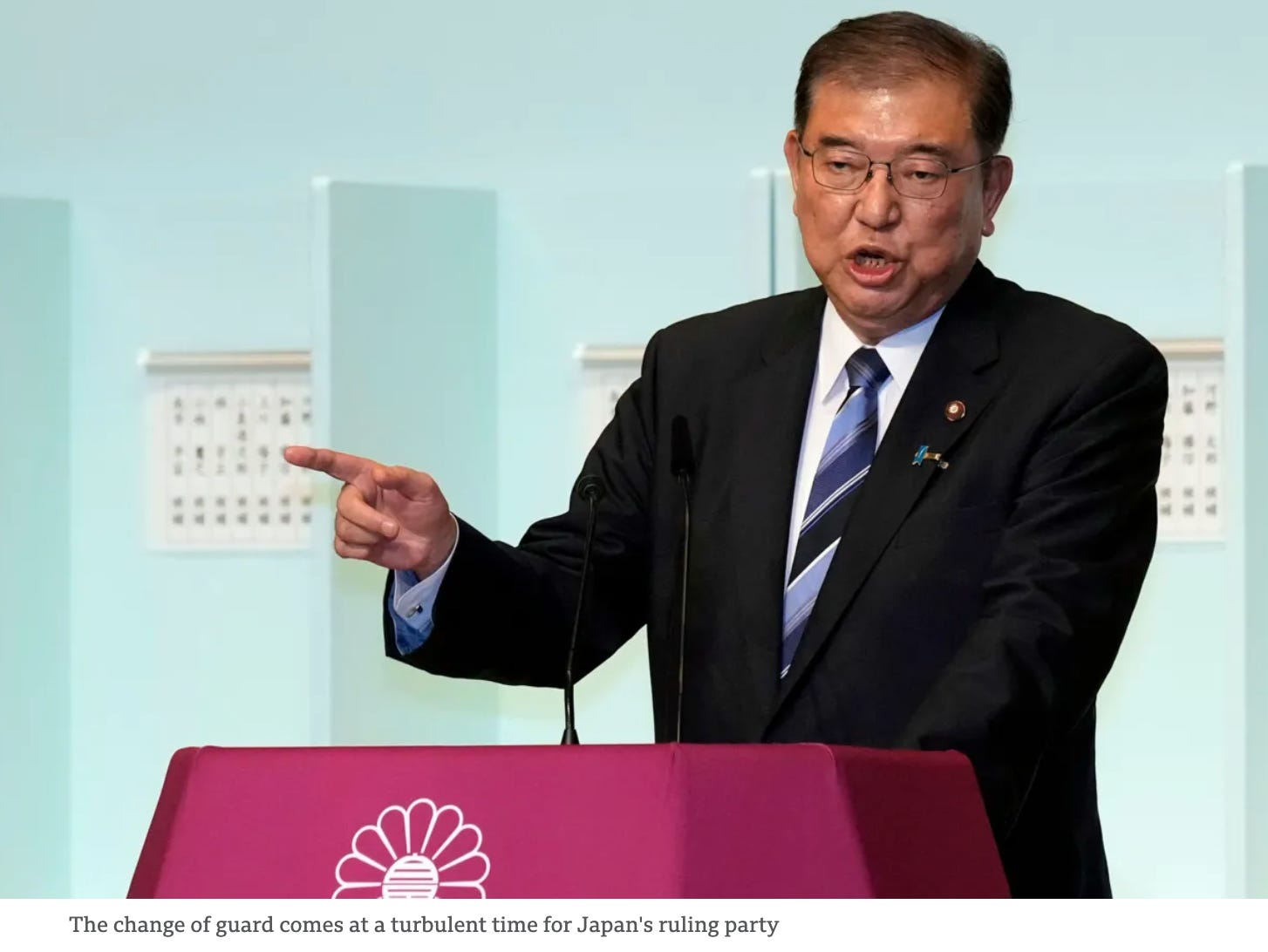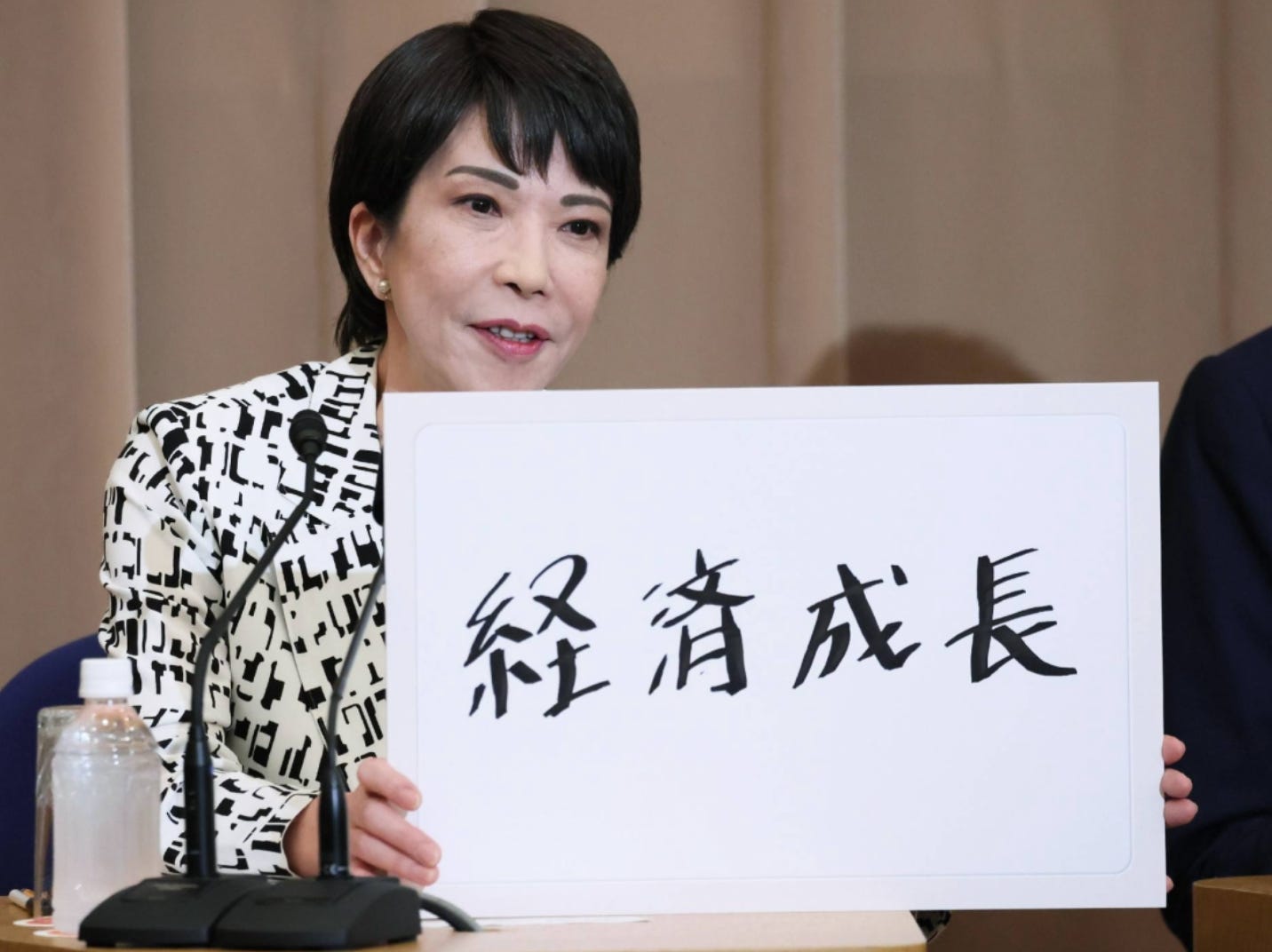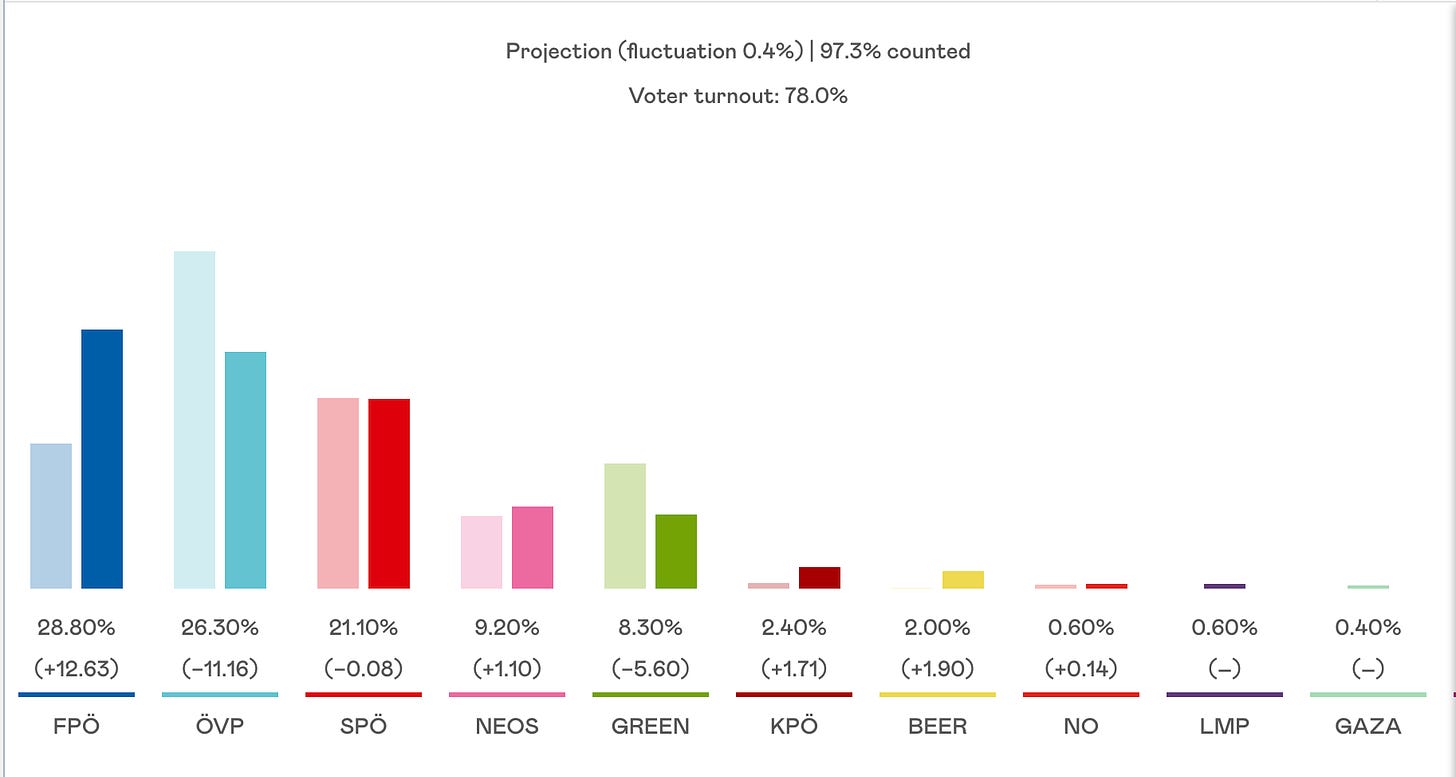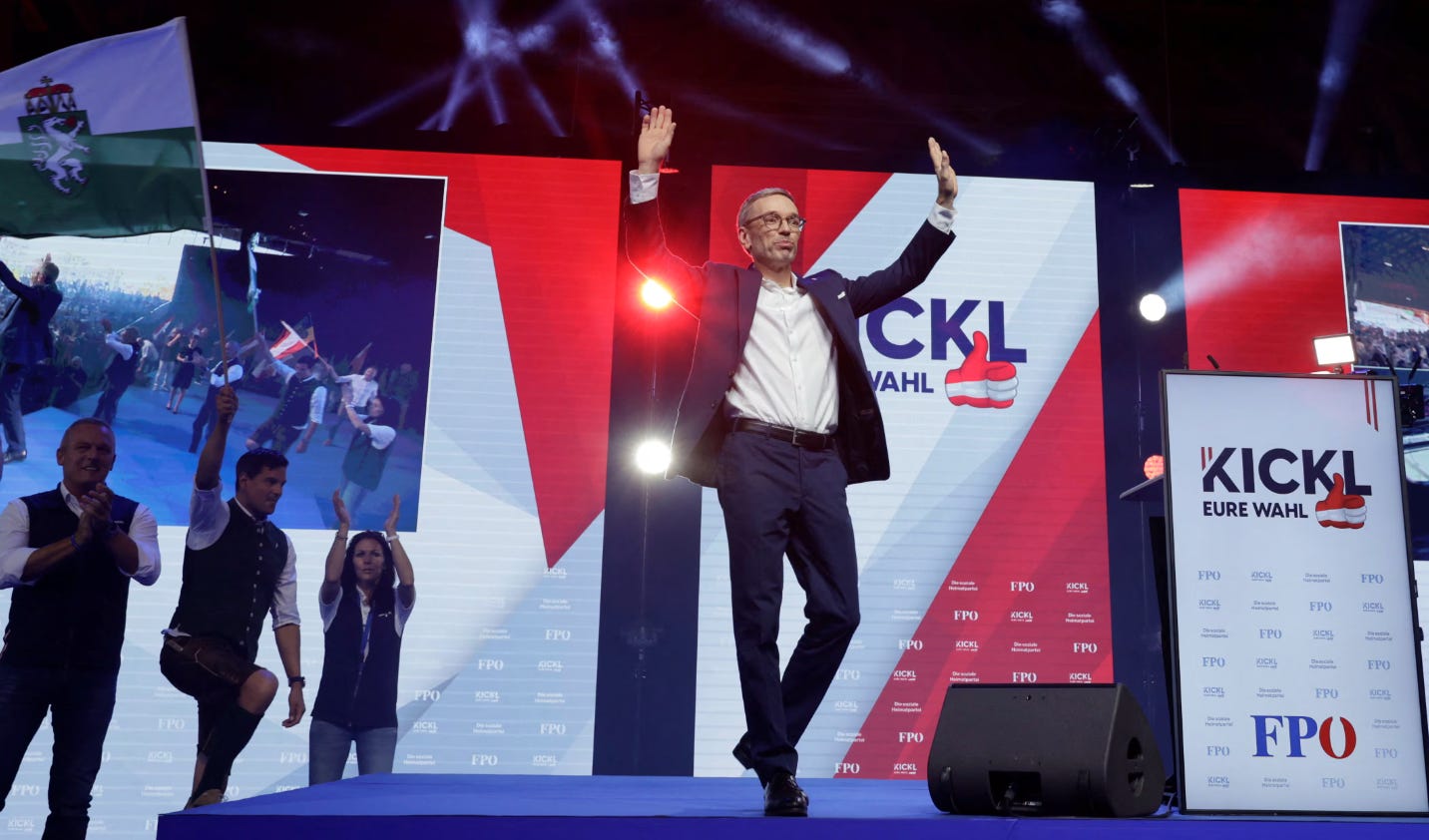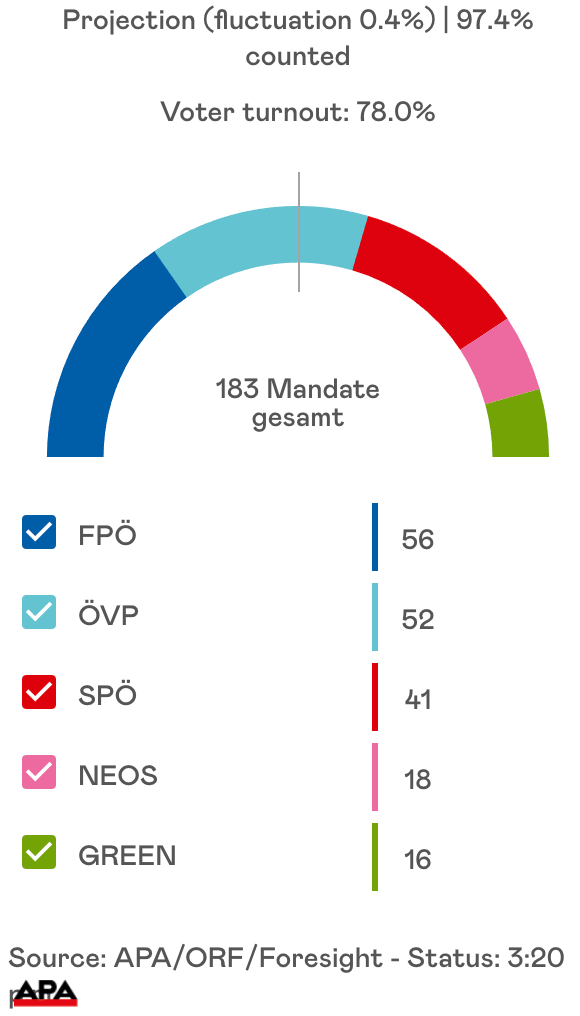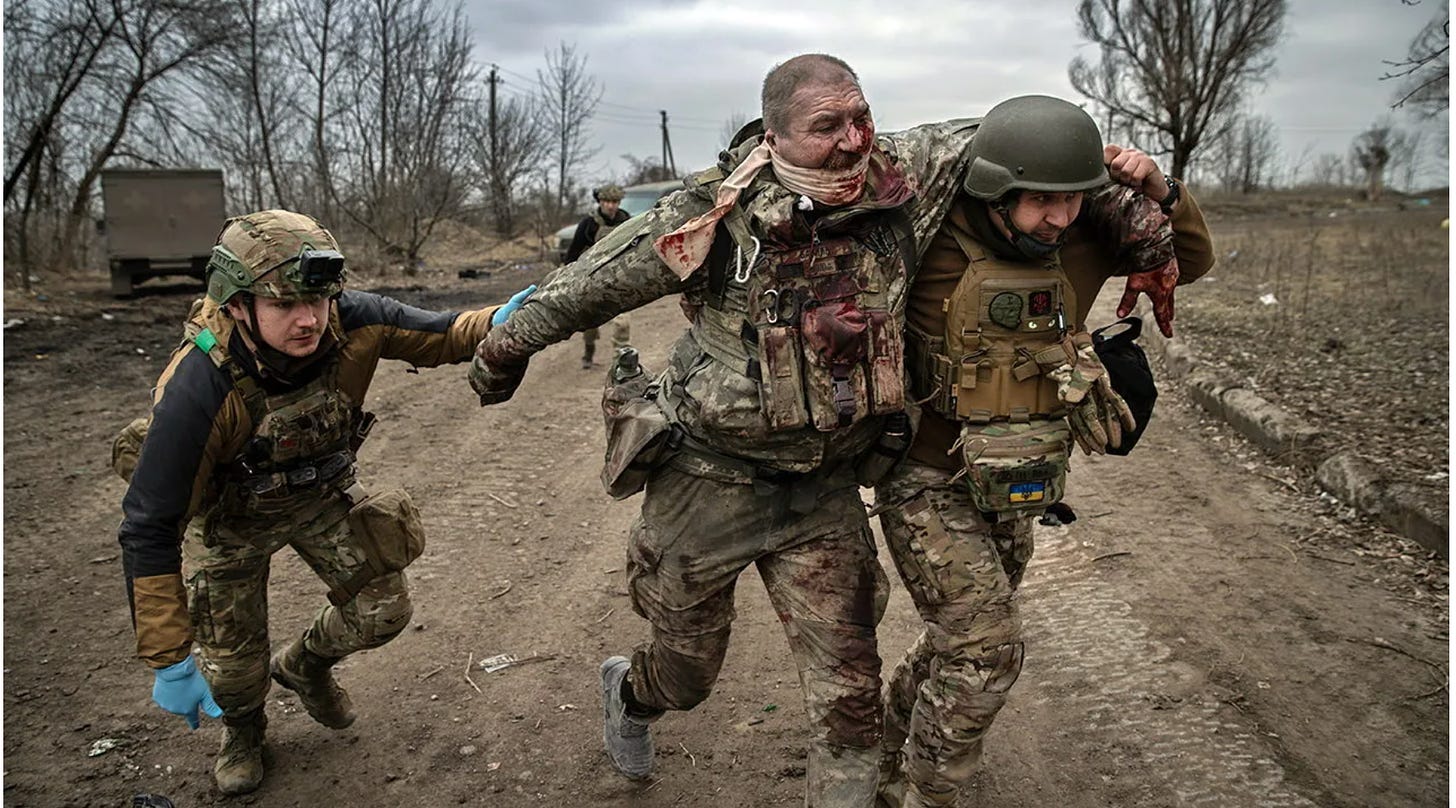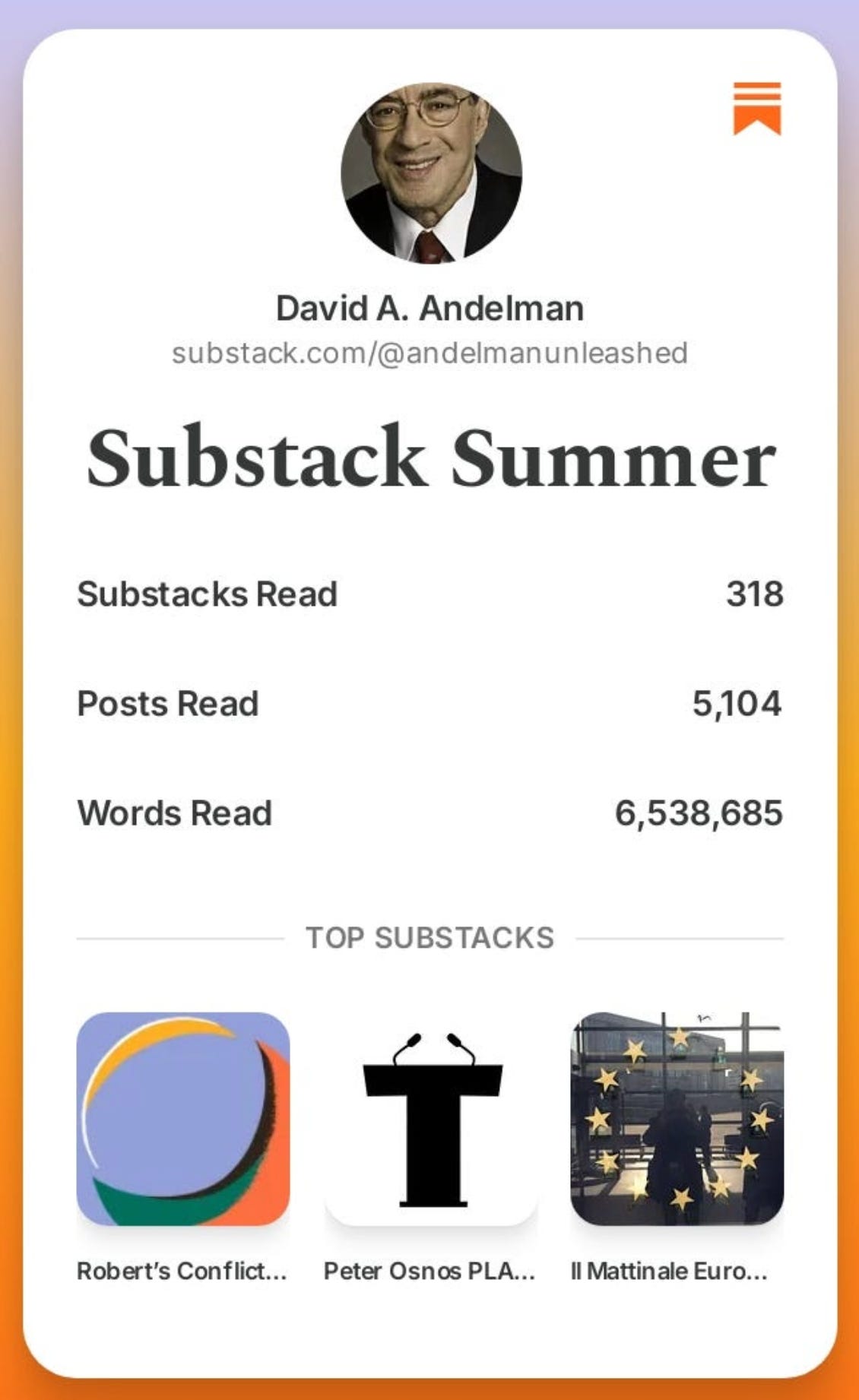TWTW: The World This Week #110
MidEast: the world holds its breath…Elections 2024: Japan re-centers, Austria's Anschluss?...Ukraine's grumpy…For our paid: China grapples with retirement…cartoonist Sherif Arafa has AI flying a kite.
In this weekly feature for Andelman Unleashed, we continue to explore how the media of other nations are reporting and commenting on the United States, and how they are viewing the rest of the world.
How the World sees the Mideast
Making the Middle East (or the World?) safer…
….is not exactly what seems to be the fallout (or perhaps even the original intention) of Israel's successful effort at taking out the venerable leader of Hezbollah, Hassan Nasrallah, who has led the terrorist organization for 32 years….
….not to mention six other apartment buildings above and beyond his underground headquarters just south of Beirut. I discussed some of this live on Saturday with WTOP in Washington……
The reality is that for every Hezbollah (or for that matter Hamas) leader who is killed by massive air strikes or targeted attacks, a dozen other individuals remain to step in quickly and perhaps even more virulently. So, The Times of Israel quickly singled out….
…the man widely regarded as [Nasrallah’s] heir, Hashem Safieddine. As head of the executive council, Safieddine oversees Hezbollah’s political affairs. He also sits on the Jihad Council, which manages the group’s military operations.
Safieddine is a cousin of Nasrallah and like him is a cleric who wears the black turban denoting ostensible descent from Islam’s Prophet Mohammed. The US State Department designated him a terrorist in 2017, and in June he threatened a major escalation against Israel after the killing of another Hezbollah commander.
At the same time, it is by no means clear how much Israel has truly decimated the ability of Hezbollah to continue war against Israel even in the medium term. As the Institute for the Study of War observed:
Hezbollah appears to be suffering from temporary organizational paralysis, as it has not responded to Israel in any meaningful way and has failed to stop Israel from targeting its key leadership or take necessary steps to protect that leadership. Hezbollah has built a professionalized military force that should be able to overcome this disruption, however, if given the time and space to do so. All the commanders that Israel has killed have deputies who should in principle be able to fill those roles and help the force recover, although they will have taken over under extremely difficult circumstances and under intense pressure.
Moreover, as Israel and especially the Netanyahu government, not to mention the prime minister himself, have been trumpeting their successes in assassinating Hamas and more recently Hezbollah leaders, one fact remains buried in their lists. On July 30, Fuad Shukr, described by Al Jazeera as "founding member of Hezbollah’s armed wing [who] Israel and the US have accused him of leading major attacks" was killed in one of the early air strikes in Beirut. Described at the time by Reuters as "the biggest loss for the group since 2008.” Yet his death hardly decelerated for months Hezbollah's attacks on northern Israel that have turned stretches of that region into a no-man's-land. As The Times of Israel reported:
Schools in the Mateh Asher region and all areas north of Haifa have been closed indefinitely; events have been canceled, and stores are empty, as the IDF Home Front Command has restricted public activities in northern Israel….Some 60,000 residents of 23 municipalities, villages, and regional councils along Israel’s northern border have been forced from their homes.
Indeed, as Haaretz documented last October, the evacuations were already beginning … and have not been reversed.
Indeed, the BBC reported that hours after the death of Nasrallah:
Hezbollah rockets landed again in Israeli territory on Saturday morning, targeting areas further south, so they are pushing back, but this is an uncertain period.
At the same time, if there was any question how deeply invested in this the entire Israeli government was in this mission, the prime minister's office released this photo of Netanyahu authorizing it from his hotel room in New York where he'd just addressed the UN General Assembly defiantly….
And then came this extraordinary video from inside the Israeli command room during the raid on Hezbollah headquarters, released shortly after the operation by the Israeli Air Force and published by the Italian daily La Stampa. It shows, coordinating the attack, a balding Israeli Defense Minister Yoav Gallant seated at the right hand of General Herzi Halevi, who took over as Chief of the General Staff in January 2023 and has presided over the entirety of Israel's wars successively in Gaza and now Lebanon.
The reality is that this only makes the region that much more dangerous as Israel has again trumpeted its success in assassinating a leader as beloved in vast stretches of the Moslem world as he is reviled and feared within Israel….
And then, unsurprisingly, came the official commentary from Iran as reported by Al Jazeera:
Iran’s Supreme Leader Ayatollah Ali Khamenei has called on Muslims around the world to unite and “stand by the people of Lebanon and the proud Hezbollah." Khamenei described Israel’s policy as “short-sighted” and called the deadly strikes on Lebanon “criminal”.
“The Zionist criminals need to know that they are far too weak to be able to inflict any significant damage on the solid structure of Lebanon’s Hezbollah,” he said in a statement. “The massacre of the defenceless people in Lebanon once again … proved the short-sighted and stupid policy of the leaders of the usurping regime. The fate of this region will be determined by the forces of resistance, with Hezbollah at the forefront.”
Mohammad Marandi, a Teheran University lecturer and member of the Iranian nuclear negotiating team in Vienna told Al Jazeera:
It is “clear” that Israel “still cannot defeat” the Lebanese armed group militarily. “I think Israel is underestimating what it is up against,” Marandi, adding that most of Lebanon is united against the “barbaric” military operation of Israel.
“The savagery that we are seeing, murdering hundreds of people a day in Beirut and elsewhere, is only going to spark anger across the Global South” against Israel and the West, predicting developments in the coming days that Israel “will not be expecting”.
“Hezbollah has thousands of many young commanders who have been trained and prepared for many years now,” he said.
Khamenei called an urgent meeting of Iran's national security council but given the way it has responded to previous Israeli attacks, including assassinations of Hamas leaders within Iran, it is questionable whether we will know the nature of any Iranian response until it occurs. Much as Israel has conducted its missions.
And if you will permit one editorial comment ….
Sadly, perhaps paradoxically, it seems that all three forces arrayed in and around the Holy Land this week that ushers in the Days of Awe, the holiest period of the Jewish year, require war and conflict to survive. For Hamas and Hezbollah, it has been and remains their ticket to power and influence within the lands they control. For Netanyahu, every day of war is another day's delay of trials for corruption and worse that could plunge him into a judicial and punitive wind tunnel from which he recognizes he is unlikely to escape unscathed.
How others see America
Powerless, while seeking a moral high ground
The leading Egyptian daily Al Ahram, while chronicling an emergency meeting between the foreign ministers of Egypt an Iran, also wasted no time in detailing President Biden's reaction to the wave of Israeli assassinations:
Biden called the killing of Hezbollah leader Hassan Nasrallah "a measure of justice for his many victims, including thousands of Americans, Israelis and Lebanese civilians." The US president reiterated US support for "Israel's right to defend itself against Hezbollah, Hamas, the Houthis, and any other Iranian-supported terrorist groups.
Biden added that he had directed Defense Secretary Lloyd Austin to "further enhance the defense posture of US military forces in the Middle East region to deter aggression and reduce the risk of a broader regional war." His statement came as the State Department ordered the family members of its diplomats in Beirut to leave while authorizing the departure of some staff "due to the volatile and unpredictable security situation in Beirut."
And Jeremy Bowen, international editor of the BBC observed:
US Secretary of State Antony Blinken defended the policy he has worked on for months. He said there was still room for negotiation. That assertion is looking hollow. The Americans have very few levers to use against any side. They cannot, by law, talk to Hezbollah and Hamas as they are classified as foreign terrorist organisations. With the US elections only weeks away, they are even less likely to put pressure on Israel than they have been in the last year.
As for the American presidential candidates themselves, they've had little to say. From the Trump camp comes son-in-law Jared Kushner with a rare tweet:
Elaborating, he continued:
Anyone who has been calling for a ceasefire in the North is wrong. There is no going back for Israel. They cannot afford now to not finish the job and completely dismantle the arsenal that has been aimed at them. They will never get another chance. After the brilliant, rapid-fire tactical successes of the pagers, radios, and targeting of leadership, Hezbollah’s massive weapon cache is unguarded and unmanned. Most of Hezbollah fighters are hiding in their tunnels. Anyone still around was not important enough to carry a pager or be invited to a leadership meeting. Iran is reeling, as well, insecure and unsure how deeply its own intelligence has been penetrated. Failing to take full advantage of this opportunity to neutralize the threat is irresponsible….
The right move now for America would be to tell Israel to finish the job. It’s long overdue. And it’s not only Israel’s fight.
As for Kamala Harris, her brief written statement, as quoted by London's Guardian, mirrored the views of Joe Biden:
Hassan Nasrallah was a terrorist with American blood on his hands. Across decades, his leadership of Hezbollah destabilized the Middle East and led to the killing of countless innocent people in Lebanon, Israel, Syria, and around the world. Today, Hezbollah’s victims have a measure of justice. I have an unwavering commitment to the security of Israel. I will always support Israel’s right to defend itself against Iran and Iran-backed terrorist groups such as Hezbollah, Hamas, and the Houthis.
But it may be left to Belgian cartoonist Steven Degryse, drawing under the name lectrr for the renowned Flemish newspaper De Standaard, with the final word:
"Let us hope that the situation in the Middle East does not get any worse."
Special for the Paid !
Andelman Unleashed has unleashed new, (lightly) paid tiers. Now, we'll be offering our Unleashed Mailbox via Zoom….Our paid subscribers can pose questions. We'll answer them via zoom on Fridays, live and archived.
E-mail us by midnight Wednesday: daandelman@substack.com
It's just another perk for our cherished, paid members of our Unleashed family, along with our closing cartoon each week from Cartooning for Peace, and other special features en route… so do sign up… cheaper than a monthly mocha grande.
This will also help us subscribe to more (expensive!) media across the globe and support great journalism in multiple languages.
Elections 2024: Japan, Austria
Japan: Toward an empress?
Leadership in Japan is often decided less by the electoral participation of all eligible Japanese voters than by a far narrower balloting by members of the ruling party. So, in line with the Andelman Unleashed pledge to chronicle every national (leadership) election in every country, it's appropriate to have a look at what just happened in Japan. As the BBC 's Shaimaa Khalil reported:
Japan’s scandal-hit ruling party has elected Shigeru Ishiba as its new leader, positioning the former defence chief as Japan's next leader. Ishiba, 67, said he would clean up his Liberal Democratic Party (LDP), revitalise the economy and address security threats after winning Friday's party election.
Since the LDP has an unchallenged parliamentary majority, its party chief will become prime minister.
The change of guard comes at a turbulent time for the party, which has been rocked by scandals and internal conflicts that disbanded its once-powerful factions. Nine candidates contested for the party leadership after Prime Minister Fumio Kishida announced last month that he would not stand for re-election.
Ishiba led in most opinion polls, with this being his fifth and, he said, final bid to lead the LDP, which has ruled Japan for most of the post-war era. It headed into a run-off between Ishiba and Sanae Takaichi, 63, who vied to become Japan’s first female leader.
"ECONOMIC GROWTH"
Ishiba is in favour of allowing female emperors—a hugely controversial issue opposed by many LDP members and successive governments.
[Emperor Naruhito, 64, has only one child, a daughter—Princess Toshi, 22—much loved, but whose succession to the throne would require a parliamentary amendment to the law of primogeniture, which a government-appointed panel of experts has recommended.]
The BBC report continued:
Ishiba's blunt candour and public criticism of [outgoing] Prime Minister Kishida—a rarity in Japanese politics—has rankled fellow party members while resonating with members of the public. Ishiba is well-versed on the machinations of party politics as well as security policies. He said Japan must strengthen its security in view of recent incursions from Russia and China into Japan's territory and North Korea's missile tests.
At a moment of flux within the LDP, he offers a safe pair of hands and stability. What he doesn’t offer is a fresh face for an organisation desperate to reinvent itself and regain public trust amid a stagnant economy, struggling households and a series of political scandals. His economic strategy includes boosting wages to counter rising prices.
He has said that he reads three books a day and that he prefers doing that instead of mingling with his party colleagues. Takaichi, on the other hand, was one of two women vying for the LDP leadership, but was also among the more conservative of the candidates.
Austria: Remember the Anschluss?
That was when Hitler engineered the Nazi takeover of Austria en route to unleashing the Second World War. Well, it didn't really happen this time. In fact, the results of Austria's national parliamentary election actually sound a whole lot like France after their elections just before the Summer Olympics and that's still unspooling amidst continuing chaos. Here's where the near-final tabulations from Die Presse, Austria's leading newspaper of record show:
Die Presse then unpacks these numbers:
According to the latest projections, the FPÖ will come first in a National Council election for the first time, clearly ahead of the ÖVP. The SPÖ is a long way behind in third place. Neos and the Greens are fighting for fourth place, while the Beer Party and KPÖ miss out on a place in parliament. The "Presse" is reporting live.
In short, the FPÖ [ Freiheitliche Partei Österreich or Austrian Freedom Party] surged nearly 13 points since the last election in 2019, while the center-right ÖVP [Österreichische Volkspartei or Austrian People's Party] of incumbent Chancellor Karl Nehammer shed more than 11 points, a record loss, thought still managing a firm second spot ahead of the SPÖ [Sozialdemokratische Partei Österreichs or Austrian Socialist Democratic Party] that notched barely a slim tenth of a point loss from 2019. As was the case in France, the Greens were the other big loser, shedding more than 5 percentage points since the last election.
How did we arrive here? A path not much different from that of many other European countries that are tacking starboard, as Euronews explained:
The [FPÖ] appears to have successfully tapped into voters’ anxieties about immigration, inflation, Ukraine and other concerns following recent gains for the hard right elsewhere in Europe.
Kickl’s rhetoric [has been described as] “aggressive” and some of his language is deliberately provocative. The Freedom Party also calls for an end to sanctions against Russia, is highly critical of western military aid to Ukraine and wants to bow out of the European Sky Shield Initiative, a missile defence project launched by Germany.
Herbert Kickl, a former interior minister and long-time campaign strategist who has led the Freedom Party since 2021, wants to become Austria’s new chancellor. He has used the term “Volkskanzler,” or chancellor of the people, which was used by the Nazis to describe Adolf Hitler in the 1930s. Kickl has rejected the comparison.
But to become Austria's new leader, he will now need a coalition partner to command a majority in the lower house of parliament.
Still, the FPÖ began celebrating as soon as it edged into a narrow lead, for the first time since the end of World War II.
"Thank you Austria," its leaders tweeted with a very Trumpish thumbs-up:
So where does that leave us? Looking at the map of the parliament, it’s clear that any two of the two three parties could cobble together a narrow majority, though few party leaders want to see as chancellor Kickl—a close friend and ally of Hungarian autocrat Viktor Orban, close Putin ally in neighboring Hungary. FPÖ’s surge, though, could make a potent force in any future government.
Much of these dynamics or not unlike the dilemma in a host of other European countries where the far right has surged, but not into a determinative majority lead. In short, some long days, perhaps weeks, of palavering, musical chairs that could still leave ÖVP's Karl Nehammer just where he has been when the music stops.
How others see the World
Ukraine from a somewhat different perspective
Maps and reporting from inside the Ukrainian invasion of Russia suggest a bit of a stalemate for the moment, so Andelman Unleashed is going to take a pause and look at the conflict from another perspective, courtesy of our extraordinary SubStack colleagues, Two Grumpy Old Men on Ukraine.
The focus is on the increasingly critical though insufficiently examined—at least from the Ukrainian side—manpower shortages. We all know that after Putin ordered his first conscription for the war, millions fled Russia perhaps never to return. More recently, Putin's been doing all in his power to avoid another wave of callups. But our Grumpy friends had this perspective from the Kyivan side:
Ukraine regularly highlights a lack of weapons and Western delay in military aid as harming its defense against Russia’s war. However, Ukraine’s lack of trained soldiers may prove just as harmful.
While neither side releases casualty figures, hundreds of thousands of men are believed to have been killed or seriously wounded in the war. Russia is suffering more casualties, but with four times less population, Ukraine has fewer to lose. Russia says it has 700,000 troops in or around Ukraine, while Ukraine says it has 880,000 in the military, although most are not in direct combat roles.
[Ukraine's] Parliament debated for over a year before finally approving a new mobilization law this spring that lowers the draft age from 27 to 25, still older than most nations. Consequently, the average age of Ukraine’s soldiers is in the 40s, and there is no time limit on the length of their service during the war.
By then, an estimated 1 million Ukrainian men of fighting age had fled the country, seeking refuge mostly in European nations, some bribing their way out of military service. According to data from Eurostat, an estimated 4.1 million Ukrainians have temporary protection status in European Union countries alone.
Radoslaw Sikorski, foreign minister of neighboring Poland where many Ukrainians have fled and which itself fears a Putin victory could bring Russian troops directly to the 330 mile border it shares with Ukraine, had a different, more chilling perspective, according to our Grumpy colleagues:
Ukraine passed the new mobilization law “at least a year too late,” Sikorski said. “It’s best to pass such laws when you have plenty of volunteers and people don’t feel personally threatened. It’s a bit odd, isn’t it? I go to a barber in Warsaw, and my hair is cut by a Ukrainian barber, and he seems younger than you, and I ask him ‘what are you doing here? Shouldn’t you be defending your country?”
Sikorski said his Ukrainian colleagues have told him that they “need people to rotate those brave soldiers fighting at the front.” Western Europe should do as Poland has done and deny welfare benefits to draft eligible Ukrainian men in their countries, saving billions of euros annually that could be spent on weapons and helping Ukraine ease its manpower shortage.
In Germany and other countries, “if you are a Ukrainian-protected person, you get 530 euros per month plus rent,” Sikorski said. “You can make over 1,000 euros per month in Germany by attending a German language course. Stop paying those social security payments for people who are eligible for the Ukrainian draft. There should be no financial incentives for avoiding the draft in Ukraine.
How did Unleashed spend its summer?
In case you missed it last weekend….reading (and writing) like crazy! And now, onto the Fall !
And then there’s that pesky retirement age
Remember when tens of thousands of angry French men and women went into the streets to protest ….. how it nearly brought down the regime of President Emmanuel Macron, as Andelman Unleashed chronicled in March 2023.
Well, the communist leadership in China may just have learned something and now it's time to roll this out—graaaadually….as Luna Sung reported from Beijing in the South China Morning Post:
Keep reading with a 7-day free trial
Subscribe to Andelman Unleashed to keep reading this post and get 7 days of free access to the full post archives.




